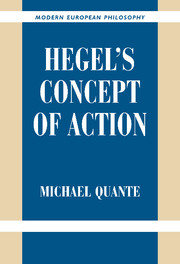Book contents
2 - Intentionality: The Form of Subjective Freedom
Published online by Cambridge University Press: 05 September 2009
Summary
In his analysis of the formal character of the subjective will, Hegel employed the concept “content,” and connected it with “end.” Determining a content as an end derives from the fact that the content of the subjective will remains indifferent to whether the form is subjective or objective; the content is “The simple identity of the will with itself in this opposition” (R §109). In the context of the subjective will, Hegel understands by “end” the following (the emphases are Hegel's):
End is α) content in me as subjectively determined – representation – β) determined to be objective – and to remain the same.
(R §109R)What can be inferred from this marginal note is that an end is a content that “as subjectively determined” is also determined “to be objective” – and as mediated in this realization through the activity of the will – “to remain the same.” Obviously this description relies on determinations that Hegel gives to the concept “content.” It is therefore necessary to investigate Hegel's use of this term and the special meaning of this concept “within the moral point of view” (R §110). The use of the concept “representation” indicates that with “content,” a cognitive component will be at issue.
Content vs. Need. In the marginal notes to §§108 and 109, Hegel makes the following remark: “Here content first comes to the fore as such.” In these notes, Hegel also makes the statement (Hegel's emphasis):
Formal determinations of content. Subjective will has a content – earlier mere need – not a question of whether it was right, – but now content exists as content of the will, and therefore essentially.
(R §109R)- Type
- Chapter
- Information
- Hegel's Concept of Action , pp. 56 - 91Publisher: Cambridge University PressPrint publication year: 2004



